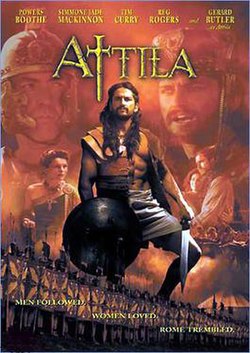| Attila | |
|---|---|
 | |
| Also known as | Attila the Hun |
| Written by | Robert Cochran |
| Directed by | Dick Lowry |
| Starring | Gerard Butler Powers Boothe Simmone Mackinnon Reg Rogers Tim Curry Alice Krige |
| Music by | Nick Glennie-Smith |
| Country of origin | United States Lithuania |
| Original language | English |
| Production | |
| Executive producers | Caldecot Chubb Sean Daniel James Jacks |
| Producers | Paul Lichtman Robertas Urbonas |
| Cinematography | Steven Fierberg |
| Editor | Tod Feuerman |
| Running time | 177 minutes |
| Production companies | Alphaville Films Attila Productions Michael R. Joyce Productions |
| Original release | |
| Network | USA Network |
| Release | January 30 – January 31, 2001 |
Attila (also known as Attila the Hun in the UK) is a 2001 American television miniseries set during the waning days of the Western Roman Empire, in particular during the invasions of the Huns in Europe.